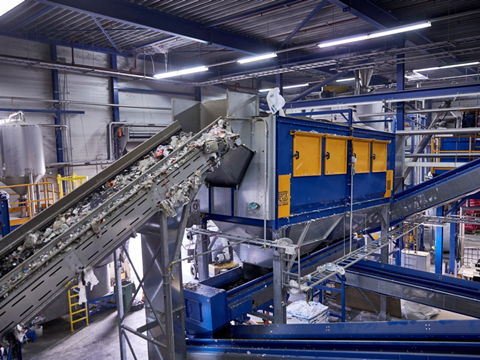
Tesco, Waitrose, Pilgrim Foodservice, WRAP, Cirrec, and other UK Plastics Pact members have formed a sprint group of industry experts and trialled trial tray-to-tray recycling for kerbside waste in a bid to prove its viability.
The group aims to demonstrate that tray waste collected through the UK’s kerbside recycling systems can be recycled back into new food trays in a circular process with productive end markets. It is claimed that the process can be repeated infinitely and prevent the loss of materials through exports and downcycling.
Waitrose, Tesco, Jayplas, Viridor, Roydon, Cirrec, Pilgrims Food Masters, and Bakkavor are among the members of the sprint group. Their collaboration is said to highlight the importance of collaboration across the packaging industry to drive progress towards the circular economy and other sustainability initiatives.
Ruth Price, strategic development manager for Faerch – Cirrec’s parent company – says: “This trial ensures that high-quality food-grade PET, sourced from the UK, remains in the packaging supply chain, reducing the need for virgin material and promoting resource circulation rather than downcycling.
“This pioneering work not only advances recycling technology and circularity but also exemplifies the principle of maximizing existing resources. Our aim is to incorporate a minimum of 30% UK kerbside waste material as recycled content for this trial.
“Faerch strongly advocates for circularity. Instead of depleting more resources, we strive to maximize the use of those already available. Our initiative collaborates closely with suppliers to drive product changes and supports broader industry efforts.”
Jonathan Moore, sector specialist for Packaging at WRAP, adds: “Through the UK Plastics Pact we have identified the lack of circularity in PET trays as priority for action and crucial to increase average recycled content. To address this shortfall, we convened a collaborative group focussed in this area, two years ago.
“We are really delighted by the collaborative efforts of members of this sprint group who’ve delivered an impressive trial. This clearly demonstrates the potential that UK household collected PET trays have to form a circular material – becoming new PET trays after use, and reducing the need for virgin polymers. One step closer to a circular economy for plastics.”
Faerch and Tesco previously joined forces in their own tray-to-tray recycling initiative. Described at the time as an ‘industry first’, it sought to recover secondary plastic packaging utilized to transport and display products at supermarkets and recycle them for into pots, tubs, and trays for food products.
This collaboration extended into 2023, with the partners incorporating 30% recycled tray content from European kerbside collection into the food-grade packaging.
If you liked this story, you might also enjoy:
How are the top brands progressing on packaging sustainability?
Sustainable Innovation Report 2024: Current trends and future priorities
Reuse vs. single use – which is better for the environment?
The ultimate guide to global plastic sustainability regulation













No comments yet